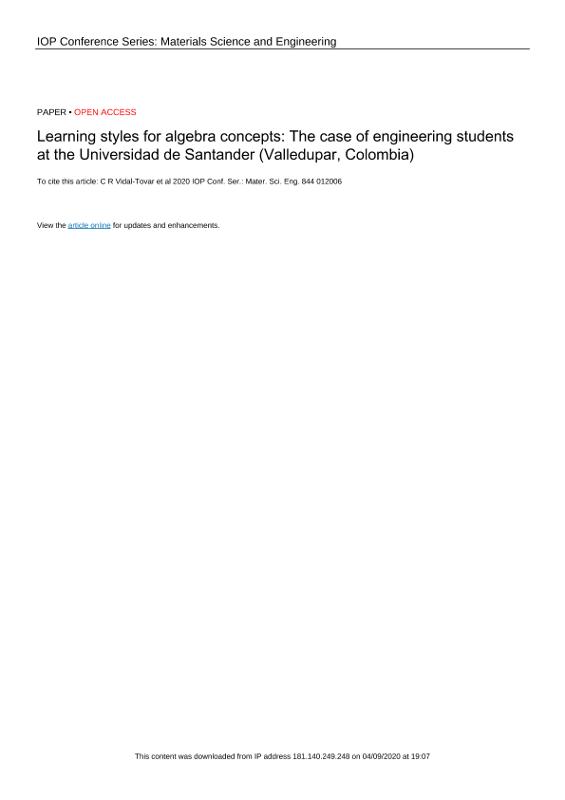Mostrar el registro sencillo del ítem
Learning styles for algebra concepts: The case of engineering students at the Universidad de Santander (Valledupar, Colombia)
| dc.contributor.author | Vidal-Tovar, C R | |
| dc.contributor.author | Valle-Fuentes, H | |
| dc.contributor.author | Rios-Dominguez, I C | |
| dc.contributor.author | Castro-Alfaro, A F | |
| dc.coverage.spatial | Valledupar, Cesar | |
| dc.date.accessioned | 2020-09-10T21:21:40Z | |
| dc.date.available | 2020-09-10T21:21:40Z | |
| dc.date.issued | 2019 | |
| dc.date.submitted | 2020-09-04 | |
| dc.identifier.citation | Vidal-Tovar, C., Valle-Fuentes, H., Rios-Dominguez, I., & Castro-Alfaro, A. (2020). Learning styles for algebra concepts: The case of engineering students at the Universidad de Santander (Valledupar, Colombia). IOP Conference Series: Materials Science And Engineering, 844, 012006. doi: 10.1088/1757-899x/844/1/012006 | spa |
| dc.identifier.uri | https://hdl.handle.net/20.500.12585/9373 | |
| dc.description.abstract | The objective of this research was to evaluate the learning styles for algebra concepts of the students of the industrial engineering program of the University of Santander, Valledupar, Cesar, Colombia. A descriptive study was developed, consisting of 40 algebra students and 6 mathematics teachers, the questionnaire is self-administered elaborated with a dichotomous scale for the student and for interpretation of the means, a scale was designed based on a scale between zero and five that reveals the score obtained in said test, the styles studied were active, reflective, theoretical and pragmatic. Concluding that the predominant style is the pragmatic and theoretical, which allowed to select and apply strategies aimed at generating interactivity between students and teachers around the knowledge of algebra. | spa |
| dc.format.extent | 9 páginas | |
| dc.format.mimetype | application/pdf | spa |
| dc.language.iso | eng | spa |
| dc.rights.uri | http://creativecommons.org/licenses/by-nc/4.0/ | * |
| dc.source | IOP Conf. Series: Materials Science and Engineering 844 (2020) 012006 | spa |
| dc.title | Learning styles for algebra concepts: The case of engineering students at the Universidad de Santander (Valledupar, Colombia) | spa |
| dcterms.bibliographicCitation | Giuliano C, Moser L, Poremba V, Jones J, Martin E and Slaughter R 2014 Use of a unified learning style model in pharmacy curricula Currents in Pharmacy Teaching and Learning 6 4157 | spa |
| dcterms.bibliographicCitation | Romero L, Alarcón M and Gómez M 2014 Learning styles and web technology use in Business and Economics university students Carlota Procedia-Social and Behavioral Sciences 141 12811290 | spa |
| dcterms.bibliographicCitation | Fong W, Severiche C, Jaimes J, Marrugo Y and Espinosa E 2017 Cognition and Its Relationship with Endogenous and Exogenous Factors in Engineering Students International Journal of Applied Engineering Research 12 6929-6933 | spa |
| dcterms.bibliographicCitation | Shinnick M and Woo M 2015 Learning style impact on knowledge gains in human patient simulation Nurse Education Today 35 63-67 | spa |
| dcterms.bibliographicCitation | Tocci A 2013 Estilos de aprendizaje de los alumnos de ingeniería según la programación neurolingüística Revista Estilos de Aprendizaje 12 12-20 | spa |
| dcterms.bibliographicCitation | Fong W, Severiche C, Pitre R, Vargas L and Espinosa E 2017 Association Between Self-Regulation of Learning, Student Attitude, Provenance and Age in Engineering Students Contemporary Engineering Sciences 10 665-672 | spa |
| dcterms.bibliographicCitation | Gómez E, Jaimes J and Severiche C 2017 Estilos de aprendizaje en universitarios, modalidad de educación a distancia Revista Virtual Universidad Católica del Norte 50 383-393 | spa |
| dcterms.bibliographicCitation | Safarin M, Mohd N, Subari K and Zolkiflibin M 2013 Visualization Skills and Learning Style Patterns among Engineering Students at Universiti Teknologi Malaysia Procedia - Social and Behavioral Sciences 93 1769-1775 | spa |
| dcterms.bibliographicCitation | Waes L, Weijen D and Leijen M 2014 Learning to write in an online writing center: The effect of learning styles on the writing process Computers & Education 73 60-71 | spa |
| dcterms.bibliographicCitation | Abdul-Rahman S and Boulay B 2014 Learning programming vía worked-examples: Relation of learning styles to cognitive load Computers in Human Behavior 30 286-298 | spa |
| dcterms.bibliographicCitation | Eishani K, Saa'd E and Nami Y 2014 The Relationship Between Learning Styles and Creativity Procedia – Social and Behavioral Sciences 114 52-55 | spa |
| datacite.rights | http://purl.org/coar/access_right/c_abf2 | spa |
| oaire.version | http://purl.org/coar/version/c_970fb48d4fbd8a85 | spa |
| dc.identifier.url | https://iopscience.iop.org/article/10.1088/1757-899X/844/1/012006 | |
| dc.type.driver | info:eu-repo/semantics/lecture | spa |
| dc.type.hasversion | info:eu-repo/semantics/publishedVersion | spa |
| dc.identifier.doi | 10.1088/1757-899X/844/1/012006 | |
| dc.subject.keywords | Estilos de aprendizaje | spa |
| dc.subject.keywords | Álgebra - Aprendizaje | spa |
| dc.rights.accessrights | info:eu-repo/semantics/openAccess | spa |
| dc.rights.cc | Atribución-NoComercial 4.0 Internacional | * |
| dc.identifier.instname | Universidad Tecnológica de Bolívar | spa |
| dc.identifier.reponame | Repositorio Universidad Tecnológica de Bolívar | spa |
| dc.publisher.place | Cartagena de Indias | spa |
| dc.type.spa | Otro | spa |
| dc.audience | Público general | spa |
| oaire.resourcetype | http://purl.org/coar/resource_type/c_c94f | spa |
Ficheros en el ítem
Este ítem aparece en la(s) siguiente(s) colección(ones)
-
Productos de investigación [1453]
Universidad Tecnológica de Bolívar - 2017 Institución de Educación Superior sujeta a inspección y vigilancia por el Ministerio de Educación Nacional. Resolución No 961 del 26 de octubre de 1970 a través de la cual la Gobernación de Bolívar otorga la Personería Jurídica a la Universidad Tecnológica de Bolívar.













